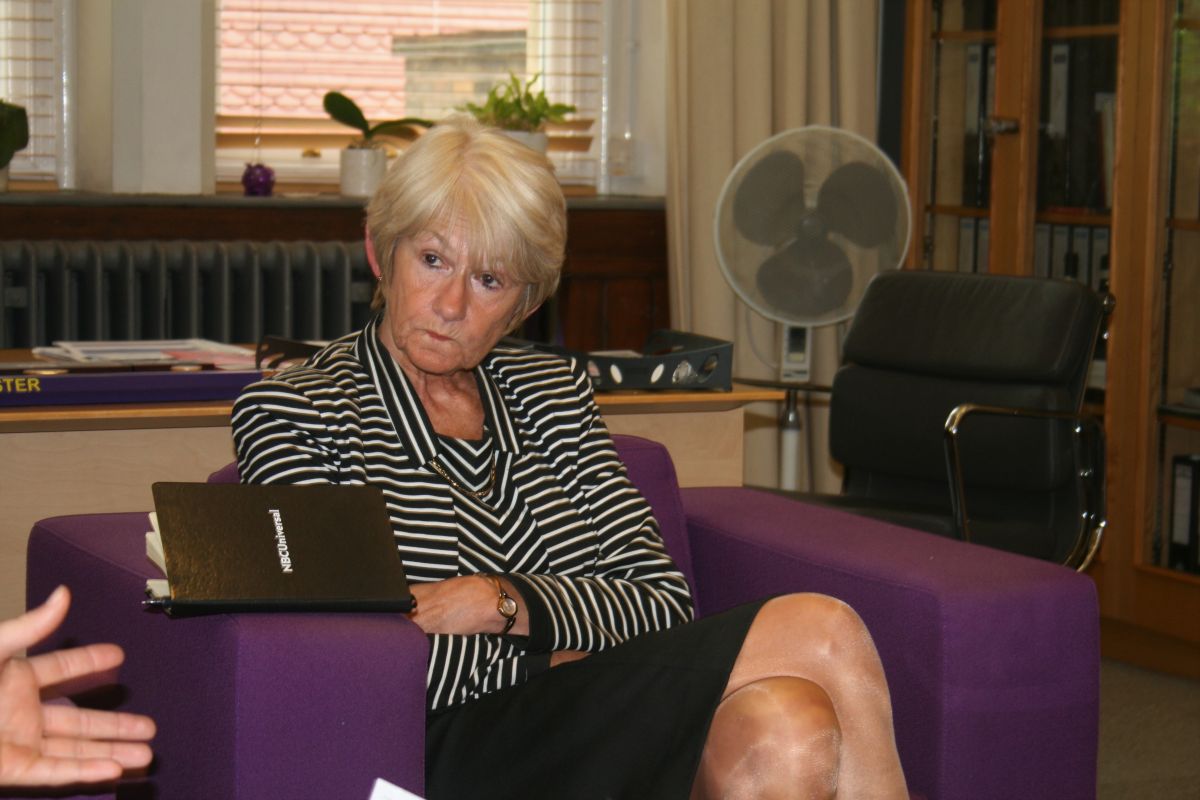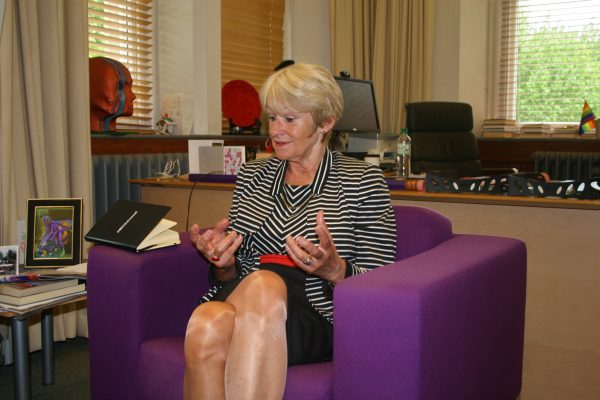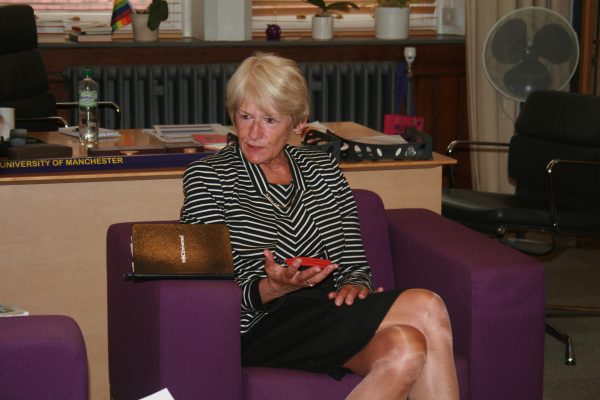Year in Review 2019: Interview with Nancy Rothwell
By Ethan Davies

Professor Dame Nancy Rothwell will have been the Vice-Chancellor and President of the University of Manchester for nine years come June 2019, having taken over from Alan Gilbert in 2010. It’s fair to say that 2018-19 might have been her most testing year yet, having seen the aftermath of the spring 2018 UCU staff strike, a large fall in the University’s surplus, and frequent calls from student activists to divest.
On top of this, Prof Dame Rothwell also plays an active role in researching “what causes the damage in the brain after a stroke or in dementia”, as well as being a Fellow of the Royal Society, Co-Chair of the Prime Minister’s Council for Science and Technology, a Deputy Lieutenant for Greater Manchester, Chair of Corridor Manchester Board, a member of the Greater Manchester Local Enterprise Partnership Board and a member of the Northern Powerhouse Partnership Board.
She’s got a lot on.
So, in a climate of genuine uncertainty surrounding Higher Education funding, given the recent Augar Report and Brexit uncertainty, where does the Vice-Chancellor see the University heading in the next few years, and how has she seen this academic year?
Perhaps the most pressing issue is the University’s finances – the 2017-18 accounts revealed that the surplus – profit, in effect – fell by nearly £40 million to £25 million in that year, which meant Manchester missed a crucial target of having a surplus equivalent to 5-7% of total income. The final proportion was just 2.4%.
“I think there’s no Vice-Chancellor in the country who wouldn’t say they have [financial] concerns, because fundamentally our income streams are level and not going up with inflation and most of costs are going up – which means we have to look at different ways of doing things.”
Staff are the main driver for those increasing costs: Manchester now is a real living wage employer, as well as “the fact that the [University] trustee has recommended that there are additional payments to meet the deficit” in the pension pot which created the industrial dispute last year.
That strike of spring 2018 is still clearly in the psyche of University leadership. Whilst “it had no effect on the balance sheet”, Rothwell is clear in saying she thinks “it had a big effect on students… [and] obviously staff – [for] many of whom it was distressing”.
She admits that she hasn’t “seen any cases that have come through” for students wanting compensation for their lost teaching, and points to the fact that there are “very small numbers in some universities” across the country.

Finance is evidently a challenge for the whole Higher Education sector, and with Manchester being the largest player in terms of student numbers, the effect of even small changes would be huge. These challenges also come at a time when students are increasingly demanding the University divest away from industries associated with some of the world’s largest issues – climate change and human conflict.
Prof Rothwell is keen to point out that Manchester’s “investments are determined not by me but by the investment committee”, regardless of the areas in which students are concerned.
Anti-climate change student activists have been very prominent on campus this year, with the People and Planet Society storming a meeting of the University’s leadership. So, the question is: will the University divest the £9.7 million they have invested in fossil fuels?
“I think you have to be careful about the difference between what is an important statement and what is a gesture.
“I worry about the fact we are a university that uses a great deal of fossil fuels, because we use a lot of electricity, for our students, for our facilities, for our research. I don’t want to make a gesture, if you like, just to keep some people happy when the bigger issue, and it is a big issue – I am really worried about climate change – is that we’ve got to reduce our use of fossil fuels.”
She also adds that it’s not a ‘no’ forever, by saying the University “continually review” their investment portfolio, and Manchester are taking steps to de-carbonise, including the 10,000 actions programme. However, there is also another element of message-sending: Activists say that if Manchester divest, then other Russell Group universities may follow suit, and so on.
“I think that’s a reasonable argument but I come back to putting [it] into the context of the vast use that we put to [fossil fuels]. We’re trying to think about ways to discourage people from flying, that would have a much bigger impact, I think, than not investing £9.7 million or whatever it is today.
“So I think it’s a balance, I prefer to do things that I know will make a difference rather than ones that are popular and might. I take their case; I have huge sympathy with them. I feel somewhat reassured that young people are really taking climate change seriously where others in the past have not.”
The other investment which draws criticism is the University’s money in Caterpillar, the machinery company. The BDS Israel movement say that Caterpillar machines are used by the Israeli Defence Force (IDF) to destroy Palestinian settlements, which should be cause enough for the University to pull their money from Caterpillar to send a message to the American giant.
“Caterpillar is a company that makes materials, goods, for lots of different purposes. Once we go down the line of saying any company that makes anything that is used in any military context, we’re into every form of clothing, every form of food, every form of footwear. It doesn’t make military equipment – it makes equipment that can be deployed for military purposes so that I think then you get into the impossible then of trying to trace a whole supply chain”.
Rothwell also wants to draw a distinction between the two investments: “fossil fuels are undoubtedly linked to climate change. That’s a different issue, it’s about [contextualising] fossil fuels in a modest investment versus doing active things to not use fossil fuels.
“Caterpillar is completely different as far as I’m concerned, that’s not to make any comment about Israel and Palestine, it’s just that you can’t go down that supply chain route forever.”

Having dealt with the financial side of the University, it was time to ask some questions from students themselves – over 90 were submitted from one FSG post, a group which Rothwell was made aware of in this interview. The first issue raised was the future of Fallowfield Halls of Residence and the ResLife programme.
Rothwell was very plain when asked if she felt the staff and student criticism of the new ResLife format was valid, with those concerned claiming it followed the system at Bristol University too closely: “I think that’s a completely unfair comparison… suicide rates at Bristol are not higher than the national average. Bristol’s had a hard time for it, we’re looking at putting in professional staff rather than having staff who are not professional – so I think it’s completely spurious.”
ResLife is of course not the only uncertainty surrounding Fallowfield: Owens Park and Oak House have long been earmarked for demolition, and it looks as if that’s still the case, due to the fact the new £152-per-week Unsworth Park will supersede the pair of older, cheaper Halls.
“Eventually, at some point it will [be the end for Owens Park and Oak House] yeah, because the money we’d have to put in to make [them] sustainable – all of them have a large carbon footprint – it would cost more to get them up to a reasonable standard then it would to build new [residences]”.
Fallowfield’s other major uncertainty is of course crime. Rothwell is aware of it, and is more concerned with keeping students safe, rather than burglaries.

Mental health has arguably become the biggest problem to face the student community as awareness has grown to show the true scale of the issue. Interestingly, students face mental health issues at the same rate as those outside of university, but that hasn’t stopped the University “upping the funding again”, and also invested in a new mental health facility for all four Manchester universities on Oxford Road, open for September.
“I really hope it’s going to benefit students in that they would know they have a single place they can go to which bypasses what can be a difficult route to get into specialist NHS treatment.
“The idea of this is that there will be a very rapid triage, that it’ll be dedicated to students, there’ll be experts on site, psychiatric nurses, that will be there to get students the help they need quickly, rather than having to wait. I don’t think it will solve all the problems, I think it will be a big help.”
Of course, prevention is better than cause with mental health, and exercise is known to help with well-being, which is why the University run well-being sessions featuring exercise during high-stress times. However, many of the student-generated questions put to Prof Dame Rothwell were around sport funding, with students saying it was chronically underfunded – what does the Vice-Chancellor say to them?
“It could always be better funded, it needs work, it needs expenditure – and it will be a difficult balance between ‘do we put money into sport, or into the library, or into student counselling, or student residences’ – there’s always that balance of course, all really important [things] to put money into.”
One area in which the University does put money and makes a loss is campus food – the cost of which Rothwell puts down to the fact “[we] pay above the living wage, we have very generous sick and maternity leave, we pay a very generous pension, we try and source locally, we try to give a range for our students, which isn’t always available in other [outlets]. We’re putting a lot of money and effort into trying to abolish the use of plastic and to improve recycling”.
That brought the end to the interview, aside from one FSG question that was too good not to ask: What’s Professor Dame Nancy Rothwell’s perfect Sunday?
“I’ve just had one! Perfect Sunday: Our house in Sweden, out-walking, lovely weather, countryside, lots of trees, lakes – emails in the evening!”
And that perhaps is the forgotten side of Professor Dame Rothwell: Nancy.
Whilst she is paid handsomely by normal standards, she’s paid averagely compared to her peers. She’s devoted to her work, extremely knowledgeable in her research field, and in Higher Education as a sector – alongside having steered the University of Manchester ship for nine years.







